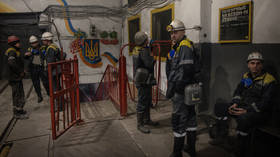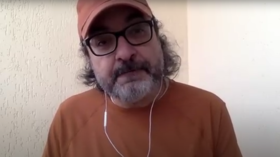US refuses to free ‘near death’ Gitmo hunger striker weighing 33kg
A prisoner at the US’ Guantanamo Bay prison, who has been on a hunger strike since 2007, may soon starve to death, as prolonged force-feeding has apparently rendered his body incapable of absorbing nutrients. The DoD opposes the ailing man’s release.
Tariq Ba Odah, a Saudi resident of Yemeni descent, was captured in Pakistan and has been held in the Guantanamo facility since 2002. In 2009 he was cleared for release by the Obama administration, but remains in US custody. In 2007 he went on a hunger strike to protest his indefinite detention without charge. After more than eight years without taking food voluntarily, he weighs less than 34 kilograms and may soon die, his lawyer says.
“Common sense dictates that Mr. Ba Odah is starving because his body is failing to properly absorb and process the liquid calories and nutrients he is being force fed. No other conclusion is viable unless one presumes the government intends to maintain him at just 56 percent of his ideal body weight while he is on hunger strike,” Omar Farah, his lawyer provided by the Center for Constitutional Rights (CCR), wrote in a legal memorandum.
The CCR sought to secure Ba Odah’s transfer on humanitarian grounds through a US federal court. However, the Department of Justice has come out against the habeas corpus petition, submitting a filing opposing it late on Friday. The filing has been kept under seal, which is “rare and unnecessary,” as CCR’s Wells Dixon told the Guardian newspaper.
IT'S NOT ENOUGH: ACLU condemns Obama’s Gitmo plan as report claims Pentagon blocking transfers http://t.co/3hhNVAHMcSpic.twitter.com/40WaRJAF2t
— RT America (@RT_America) August 14, 2015Ba Odah’s lawyer Farah said the rights group was “deeply disappointed by this secret filing.”
“It is a transparent attempt to hide the fact that the Obama administration’s interagency process for closing Guantánamo is an incoherent mess, and it is plainly intended to conceal the inconsistency between the administration’s stated intention to close Guantánamo and the steps taken to transfer cleared men. The administration simply wants to avoid public criticism and accountability,” he said.
An anonymous US official confirmed this assessment for the British newspaper, saying the government sealed the motion in an attempt to avoid embarrassment, rather than protect classified information. The source added that hardliners in the Pentagon, who consider hunger striking a form of warfare, would not allow Ba Odah’s struggle for release go unchallenged. If his protest succeeded, it could encourage other hunger strikers and give the appearance that the DoD had suffered a substantial defeat, the reasoning goes.
The US is mishandling the hunger strike issue at Guantanamo bay, a problem that is far from unique to that facility, RT was told by Scott Allen, professor of medicine at the University of California, who was part of a task force that observed force feeding procedures carried out at detention centers.
“The key mistake that the Department of Defense has made in its approach to hunger strikes is that it thinks of them too often collectively,” he said. “If they are concerned about the life of this individual, which is what they had stated the goal was all along, they need to focus on his case and his case alone and develop a plan that would preserve his life and his dignity.”
We said then and we’ll say it again. No to indefinite detention. Anywhere. https://t.co/ka9RRQKWOMpic.twitter.com/dmkE3BWtKh
— ACLU National (@ACLU) August 12, 2015President Barack Obama made shutting down the US military detention facility at Guantanamo Bay a key issue during his first campaign, but has failed to deliver on that promise. His administration’s latest strategy is to speed up transfer of roughly half of the 116 inmates in the prison to other countries, and relocate the rest to high security prisons on US soil.
The plan has been criticized by rights groups, including the American Civil Liberties Union, which said it fails to address the wider issue of keeping people detained for decades without charge in contradiction to core western values.
‘Moving detainees to US means giving them rights’
The latest media reports from the US have suggested that the US military is seeking a place to relocate Guantanamo Bay detainees on American soil by “assessing” already existing state prisons.
However, former CIA officer Ray McGovern believes that the real reason for the endless delays in shutting down Guantanamo may lie beyond the realm of purely logistical problems.
‘Rubber stamp for endless detention’: Judge rejects Gitmo detainee’s legal challenge http://t.co/F378Zsp4fKpic.twitter.com/SOCKgcpmUe
— RT (@RT_com) July 31, 2015“I heard one lawyer, one administration lawyer, it happened to be the Bush administration, arguing in court: Once a detainee sets foot in the United States, he acquires some rights… Does that speak volumes? In Guantanamo, he has no rights according to the interpretation that Bush, and now Obama, have adopted,” McGovern told RT.
However, bringing them onto US soil would change this situation, according to McGovern.
“Once he sets foot in the United States, he has some rights. They don’t want to give anyone those rights,” he explained, adding that he “would rule out” the Obama administration actually following through on his promise to shutter Guantanamo.













